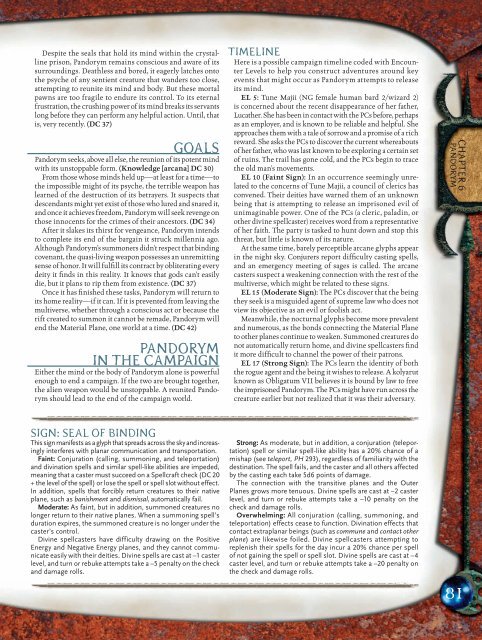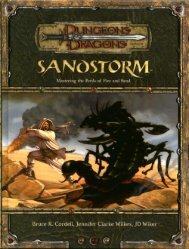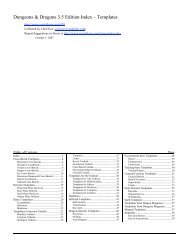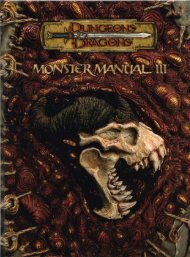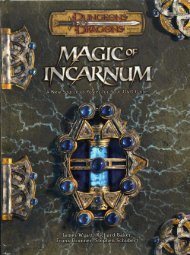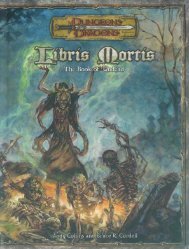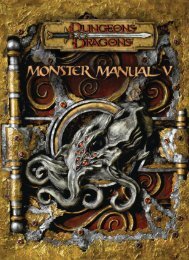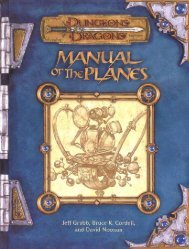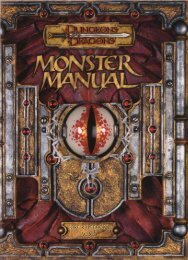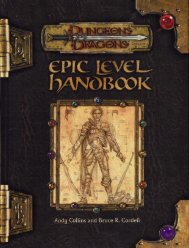Create successful ePaper yourself
Turn your PDF publications into a flip-book with our unique Google optimized e-Paper software.
Despite the seals that hold its mind within the crystalline<br />
prison, Pandorym remains conscious and aware of its<br />
surroundings. Deathless and bored, it eagerly latches onto<br />
the psyche of any sentient creature that wanders too close,<br />
attempting to reunite its mind and body. But these mortal<br />
pawns are too fragile to endure its control. To its eternal<br />
frustration, the crushing power of its mind breaks its servants<br />
long before they can perform any helpful action. Until, that<br />
is, very recently. (DC 37)<br />
GOALS<br />
Pandorym seeks, above all else, the reunion of its potent mind<br />
with its unstoppable form. (Knowledge [arcana] DC 30)<br />
From those whose minds held up—at least for a time—to<br />
the impossible might of its psyche, the terrible weapon has<br />
learned of the destruction of its betrayers. It suspects that<br />
descendants might yet exist of those who lured and snared it,<br />
and once it achieves freedom, Pandorym will seek revenge on<br />
those innocents for the crimes of their ancestors. (DC 34)<br />
After it slakes its thirst for vengeance, Pandorym intends<br />
to complete its end of the bargain it struck millennia ago.<br />
Although Pandorym’s summoners didn’t respect that binding<br />
covenant, the quasi-living weapon possesses an unremitting<br />
sense of honor. It will fulfill its contract by obliterating every<br />
deity it finds in this reality. It knows that gods can’t easily<br />
die, but it plans to rip them from existence. (DC 37)<br />
Once it has finished these tasks, Pandorym will return to<br />
its home reality—if it can. If it is prevented from leaving the<br />
multiverse, whether through a conscious act or because the<br />
rift created to summon it cannot be remade, Pandorym will<br />
end the Material Plane, one world at a time. (DC 42)<br />
PANDORYM<br />
IN THE CAMPAIGN<br />
Either the mind or the body of Pandorym alone is powerful<br />
enough to end a campaign. If the two are brought together,<br />
the alien weapon would be unstoppable. A reunited Pandorym<br />
should lead to the end of the campaign world.<br />
TIMELINE<br />
Here is a possible campaign timeline coded with Encounter<br />
Levels to help you construct adventures around key<br />
events that might occur as Pandorym attempts to release<br />
its mind.<br />
EL 5: Tune Majii (NG female human bard 2/wizard 2)<br />
is concerned about the recent disappearance of her father,<br />
Lucather. She has been in contact with the PCs before, perhaps<br />
as an employer, and is known to be reliable and helpful. She<br />
approaches them with a tale of sorrow and a promise of a rich<br />
reward. She asks the PCs to discover the current whereabouts<br />
of her father, who was last known to be exploring a certain set<br />
of ruins. The trail has gone cold, and the PCs begin to trace<br />
the old man’s movements.<br />
EL 10 (Faint Sign): In an occurrence seemingly unrelated<br />
to the concerns of Tune Majii, a council of clerics has<br />
convened. Their deities have warned them of an unknown<br />
being that is attempting to release an imprisoned evil of<br />
unimaginable power. One of the PCs (a cleric, paladin, or<br />
other divine spellcaster) receives word from a representative<br />
of her faith. The party is tasked to hunt down and stop this<br />
threat, but little is known of its nature.<br />
At the same time, barely perceptible arcane glyphs appear<br />
in the night sky. Conjurers report difficulty casting spells,<br />
and an emergency meeting of sages is called. The arcane<br />
casters suspect a weakening connection with the rest of the<br />
multiverse, which might be related to these signs.<br />
EL 15 (Moderate Sign): The PCs discover that the being<br />
they seek is a misguided agent of supreme law who does not<br />
view its objective as an evil or foolish act.<br />
Meanwhile, the nocturnal glyphs become more prevalent<br />
and numerous, as the bonds connecting the Material Plane<br />
to other planes continue to weaken. Summoned creatures do<br />
not automatically return home, and divine spellcasters find<br />
it more difficult to channel the power of their patrons.<br />
EL 17 (Strong Sign): The PCs learn the identity of both<br />
the rogue agent and the being it wishes to release. A kolyarut<br />
known as Obligatum VII believes it is bound by law to free<br />
the imprisoned Pandorym. The PCs might have run across the<br />
creature earlier but not realized that it was their adversary.<br />
CHAPTER 6<br />
PANDORYM<br />
pqqqqqqqqqqqqqqqqqqqqrs<br />
SIGN: SEAL OF BINDING<br />
This sign manifests as a glyph that spreads across the sky and increasingly<br />
interferes with planar communication and transportation.<br />
Faint: Conjuration (calling, summoning, and teleportation)<br />
and divination spells and similar spell-like abilities are impeded,<br />
meaning that a caster must succeed on a Spellcraft check (DC 20<br />
+ the level of the spell) or lose the spell or spell slot without effect.<br />
In addition, spells that forcibly return creatures to their native<br />
plane, such as banishment and dismissal, automatically fail.<br />
Moderate: As faint, but in addition, summoned creatures no<br />
longer return to their native planes. When a summoning spell’s<br />
duration expires, the summoned creature is no longer under the<br />
caster’s control.<br />
Divine spellcasters have difficulty drawing on the Positive<br />
Energy and Negative Energy planes, and they cannot communicate<br />
easily with their deities. Divine spells are cast at –1 caster<br />
level, and turn or rebuke attempts take a –5 penalty on the check<br />
and damage rolls.<br />
Strong: As moderate, but in addition, a conjuration (teleportation)<br />
spell or similar spell-like ability has a 20% chance of a<br />
mishap (see teleport, PH 293), regardless of familiarity with the<br />
destination. The spell fails, and the caster and all others affected<br />
by the casting each take 5d6 points of damage.<br />
The connection with the transitive planes and the Outer<br />
Planes grows more tenuous. Divine spells are cast at –2 caster<br />
level, and turn or rebuke attempts take a –10 penalty on the<br />
check and damage rolls.<br />
Overwhelming: All conjuration (calling, summoning, and<br />
teleportation) effects cease to function. Divination effects that<br />
contact extraplanar beings (such as commune and contact other<br />
plane) are likewise foiled. Divine spellcasters attempting to<br />
replenish their spells for the day incur a 20% chance per spell<br />
of not gaining the spell or spell slot. Divine spells are cast at –4<br />
caster level, and turn or rebuke attempts take a –20 penalty on<br />
the check and damage rolls.<br />
pqqqqqqqqqqqqqqqqqqqqrs<br />
81


